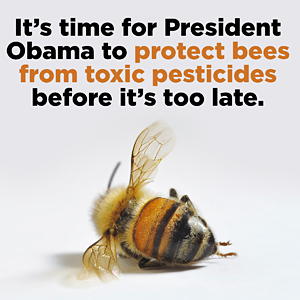03
Mar
Over 125 Groups Urge President Obama to Protect Bees and Other Pollinators from Pesticides
(Beyond Pesticides, March 3, 2015) Over 125 conservation, beekeeping, food safety, religious, ethnic and farming advocacy groups are urging President Obama and the Environmental Protection Agency (EPA) to take swift and meaningful action to protect honey bees and other pollinators from toxic pesticides. Groups, including Beyond Pesticides, raised their voice through a letter sent in advance of a pending report from the White House Pollinator Task Force, which was established last June by the President with the goal to “reverse pollinator losses and help respond populations to healthy levels.” Last October the White House announced it would miss its self-assigned deadline, delaying the urgent action that is needed to address this crisis.
 The letter urges President Obama and executive agencies to take action against a class of pesticides called neonicotinoids, systemic poisons that are devastating bee populations. They are also threatening the nation’s food supply, since one-third of the food consumed in the United States is pollinated by bees.
The letter urges President Obama and executive agencies to take action against a class of pesticides called neonicotinoids, systemic poisons that are devastating bee populations. They are also threatening the nation’s food supply, since one-third of the food consumed in the United States is pollinated by bees.
“Through bold and decisive action from the White House and EPA, we can begin to reverse bee declines and protect pollinator populations for future generations,” said Nichelle Harriott, Science and Regulatory Director at Beyond Pesticides.
Among other steps the letter calls for:
- expedited review of the registration process for neonicotinoids;
- strengthening of risk-assessment requirements;
- closure of loopholes that allow dangerous pesticides to be approved with inadequate review;
- improvements in the oversight of neonicotinoid use in seed coating;
- upgrades to EPA’s bee- and bird-killing incident reporting system; and
- EPA to comply with the Endangered Species Act by ensuring that these toxic pesticides are not killing our nation’s most imperiled species.
Neonicotinoids are widely used in U.S. agriculture and are particularly harmful because they are systemic ”” they poison entire plants, including the nectar and pollen ”” and persistent, lasting months or even years in the plant, soil and waterways.
“Bee populations across the country are declining at an alarming rate,” said Mark Emrich, beekeeper and president of the Washington State Beekeepers Association, a signatory to the letter. “Bees and beekeepers can’t be held responsible for the problems with pesticides. We need protections that ensure the continued health of our food system and agricultural economy; it’s time for the president and his task force to step up.”
“Given the historic decline in the population of pollinators ””bees, butterflies and birds, it is critical that the President and White House Task Force show forceful leadership in addressing all factors contributing to the crisis, with the suspension of neonicotinoid insecticides being a critically necessary action,” said Jay Feldman, executive director of Beyond Pesticides. “The indiscriminate poisoning of pollinators by persistent, neurotoxic neonicotinoids that translocate through plants and contaminate pollen and nectar must stop, and it will take bold action and direction from the highest level of government to ensure a timely and adequate response,” said Mr. Feldman.
Acute exposure to neonicotinoids can cause massive bee die-offs, such as the incident in which 50,000 bumblebees died in an Oregon parking lot in 2013. Even at low exposures, neonicotinoids impair bee health by affecting cognitive functions that make it possible for bees to forage, communicate and find their way back to their hives.
Join the action later this week!
Beyond Pesticides and other groups will continue to fight for the suspension of bee-toxic neonicotinoid pesticides. Individuals can support these needed changes by going to save-bees.org and signing the petition to the White House. Later this week, groups will deliver petition signatures to President Obama in front of the White House and call on the President to #BeeKindObama by taking bold and decisive action to protect pollinators. We want you there! Send an email to [email protected] to RSVP for the rally, and stay tuned for future ways you can get involved!
All unattributed positions and opinions in this piece are those of Beyond Pesticides,










